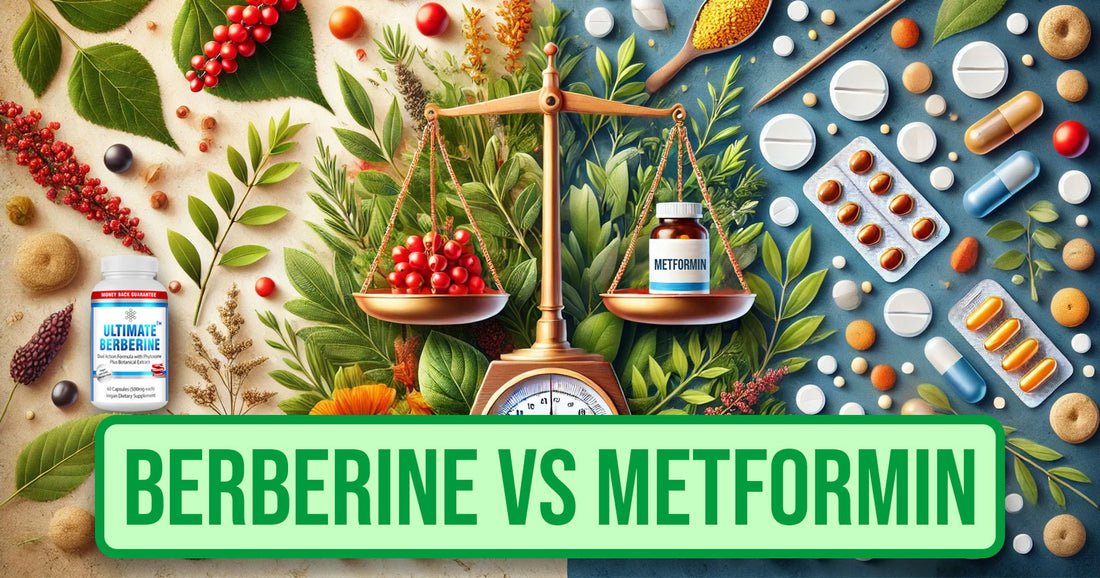
Berberine vs. Metformin: Managing Blood Sugar Levels Naturally and Medically
Today, we presents a detailed guide comparing two popular approaches to managing blood sugar levels: Berberine and Metformin. Understanding the differences, benefits, and potential side effects of these options is crucial for anyone considering supplementing their health regimen or managing conditions like Type 2 Diabetes.
What Are Berberine and Metformin?
Berberine is a natural compound extracted from several plants, including barberry, goldenseal, and tree turmeric. It has been used in traditional medicine, particularly in Chinese and Ayurvedic practices, for centuries. Known for its antimicrobial and anti-inflammatory properties, berberine has gained popularity for its ability to lower blood sugar levels and promote cardiovascular health.
Metformin, on the other hand, is a pharmaceutical drug that has been widely prescribed for over 60 years to manage Type 2 Diabetes. It is FDA-approved and considered the first-line medication for diabetes management due to its efficacy in lowering blood sugar levels and its relatively favorable safety profile. Unlike berberine, metformin is a synthetic drug that requires a prescription and has undergone rigorous clinical testing to determine its safety and effectiveness.
Primary Differences Between Berberine and Metformin
Metformin works much faster. It usually takes 4-5 days to get the full benefits. Berberine takes around 90 days or 3 months to take effect.
The primary difference between berberine and metformin lies in their origins and FDA status. While metformin is a pharmaceutical drug developed in a laboratory and approved by the FDA for the treatment of Type 2 Diabetes, berberine is a natural supplement derived from plants, commonly used in traditional medicine.
How Do Berberine and Metformin Work to Lower Blood Sugar Levels?
Both berberine and metformin work by influencing the body's metabolism to lower blood sugar levels, but they do so through slightly different mechanisms:
- Metformin primarily reduces glucose production in the liver. It also improves insulin sensitivity, making it easier for cells to absorb and use glucose from the bloodstream. Metformin's actions on the liver and insulin sensitivity make it highly effective in managing blood sugar levels.
- Berberine works by activating an enzyme called AMP-activated protein kinase (AMPK), often referred to as the "metabolic master switch." This enzyme plays a crucial role in regulating metabolism, and its activation can help reduce glucose production in the liver, improve insulin sensitivity, and increase glucose uptake in cells.
Are There Different Side Effects Associated with Berberine and Metformin?
Yes, there are different side effects associated with each:
- Metformin: Common side effects include gastrointestinal issues such as nausea, diarrhea, and stomach discomfort. In rare cases, it can cause a serious condition called lactic acidosis, especially in people with kidney issues.
- Berberine: Generally considered safe for most people, berberine's side effects are relatively mild but may include digestive discomfort, cramping, constipation, or diarrhea. It is crucial to consult a healthcare professional before starting berberine, especially if you are taking other medications or have underlying health conditions.
Can Berberine Be Used as a Natural Alternative to Metformin?
Yes, berberine is often promoted as a natural alternative to metformin, particularly for those who prefer a more holistic approach to health or who cannot tolerate the side effects of metformin. However, it's important to note that while studies show berberine can effectively lower blood sugar levels, it may not be a complete substitute for metformin in all cases. It's always best to consult with a healthcare professional before making any changes to your medication regimen.
Is Berberine as Effective as Metformin in Managing Type 2 Diabetes?
Several studies suggest that berberine may be nearly as effective as metformin in managing blood sugar levels in patients with Type 2 Diabetes. For instance, some research indicates that berberine's effect on blood sugar is comparable to that of metformin, making it a viable alternative for those looking for a natural option. However, more large-scale clinical trials are needed to fully establish berberine's efficacy relative to metformin.
What Are the Potential Benefits of Using Berberine Over Metformin?
The potential benefits of using berberine over metformin include:
- Natural Origin: Being a natural compound, berberine may appeal to those seeking a more holistic approach.
- Fewer Side Effects: Berberine is generally associated with fewer side effects compared to metformin.
- Broader Health Benefits: Beyond blood sugar management, berberine has been shown to have anti-inflammatory, antimicrobial, and cholesterol-lowering effects.
Are There Any Known Interactions Between Berberine and Other Medications?
Yes, berberine can interact with other medications, particularly those metabolized by the liver. It may affect the breakdown of certain drugs, potentially leading to increased side effects or reduced efficacy. It's crucial to consult a healthcare provider before combining berberine with other medications, especially blood thinners, antihypertensives, or drugs for managing diabetes.
Can I Take Berberine and Metformin Together for Better Results?
Some studies suggest combining berberine with metformin might have an additive effect, potentially improving blood sugar control more than either agent alone. However, combining these should only be done under strict medical supervision to avoid any adverse interactions or side effects.
Which Supplement or Medication is Safer for Long-Term Use: Berberine or Metformin?
Long-term use of both berberine and metformin appears to be safe for most people, but they each have considerations. Metformin has a well-documented safety profile, but long-term use can lead to vitamin B12 deficiency in some individuals. Berberine, while natural, lacks the extensive long-term studies that metformin has, so its long-term effects are less well understood.
How Do the Dosages of Berberine Compare to Those of Metformin?
The typical dosage for metformin in managing Type 2 Diabetes ranges from 500 mg to 2000 mg per day, divided into two or three doses. For berberine, studies often use dosages between 500 mg to 1500 mg per day, divided into two or three doses. However, the appropriate dosage can vary based on individual health conditions and should be determined by a healthcare provider.
Is Berberine Effective for Weight Loss Like Metformin?
Both berberine and metformin have been associated with weight loss, particularly in individuals with insulin resistance or Type 2 Diabetes. Berberine's impact on weight loss is believed to be due to its effects on metabolism and blood sugar levels. However, more research is needed to fully understand how each works for weight management and how they compare directly.
What Are the Natural Sources of Berberine, and How Does It Compare to Synthetic Metformin?
Berberine is extracted from various plants such as barberry, goldenseal, and tree turmeric. In contrast, metformin is a synthetic drug created in laboratories. This fundamental difference influences how each compound is used and perceived. Natural enthusiasts may prefer berberine for its plant origins, while others may prefer metformin's established safety profile.
Are There Any Clinical Studies Comparing the Effectiveness of Berberine to Metformin?
Several clinical studies suggest that berberine is comparable to metformin in managing blood sugar levels and improving insulin sensitivity. However, while promising, these studies are smaller in scale compared to the vast body of research supporting metformin's use. More extensive and longer-term studies are needed to fully compare their effectiveness.
Can Berberine Be Taken by People Who Cannot Tolerate Metformin?
Yes, berberine may be an option for individuals who cannot tolerate metformin due to its side effects, especially gastrointestinal issues. However, it is essential to consult with a healthcare professional to ensure it's an appropriate choice based on the individual's overall health condition and other medications they may be taking.
What Are the Cost Differences Between Using Berberine and Metformin?
Berberine supplements are typically available over-the-counter and can range in price depending on the brand and dosage. Metformin, being a prescription medication, may be covered by insurance plans, reducing out-of-pocket costs. For those without insurance, metformin is generally inexpensive. The overall cost difference can vary depending on dosage, brand, and insurance coverage.
What Is the Best Berberine Supplement?
The best berberine supplement is one that meets high standards of quality and potency. At Ultimate Health, we pride ourselves on offering the Ultimate Berberine Supplement.
Get it now: Ultimate Berberine
Conclusion
Both berberine and metformin offer unique advantages for managing blood sugar levels and improving overall health. Whether you prefer the traditional, natural route with berberine or the clinically tested, FDA-approved metformin, it's crucial to consider your individual needs, preferences, and health conditions. Always consult with a healthcare provider to make the most informed decision for your health.
